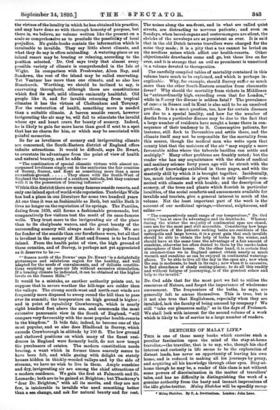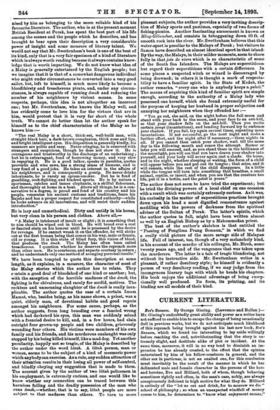SKETCHES OF MALAY LIFE.*
THIS is one of those many books which exercise such a peculiar fascination upon the mind of the stay-at-home traveller,—the traveller, that is to say, who, though his chief interest and curiosity in life seems to be the exploration of distant lands, has never an opportunity of leaving his own home, and is reduced to making all his journeys by proxy, and acquiring all his knowledge through other eyes. Stay-at-
home though he may be, a reader of this class is not without some powers of discrimination in the matter of travellers' tales, and has no difficulty in distinguishing the work of a
genuine authority from the hasty and inexact impressions of the idle globe-trotter. Malay Sketches will be speedily recog- • Malay Sketches, By F, A. Swettenbam. London: John Lane.
nised by him as belonging to the more reliable kind of his favourite literature. The author, who is at the present moment British Resident at Perak, has spent the best part of his life among the scenes and the people which he describes, and has brought to bear upon their description a very considerable power of insight and some measure of literary talent. We would not say that Mr. Swettenham's book is one of the best of its kind, only that is a very fair specimen of a kind of literature which is always worth reading because it always contains know- ledge that is worth imparting. We do not know what idea of a Malay is generally entertained by the English people ; but we imagine that it is that of a somewhat dangerous individual who might under circumstances be converted into a very good sailor, but, left to himself, is much more likely to become a bloodthirsty and treacherous pirate, and, under any circum- stances, is always capable of running amok and reducing the number of his neighbours by violent means. In some respects, perhaps, this idea is not altogether an incorrect one ; but Mr. Swettenham, who knows the Malay well, and has evidently come to love him for the virtues that are in him, would protest that it is very far short of the whole truth. We cannot do better than let the author speak for himself as to the chief characteristics of the Malay as he knows him :-
" The real Malay is a short, thick-set, well-built man, with straight black hair, a dark-brown complexion, thick nose and lips, and bright intelligent eyes. His disposition is generally kindly, his manners are polite and easy. Never cringing, he is reserved with strangers and suspicious, though he does not show it. He is courageous and trustworthy in the discharge of an undertaking ; but he is extravagant, fond of borrowing money, and very slow in repaying it. He is a good talker, speaks in parables, quotes proverbs and wise saws, has a strong sense of humour, and is very fond of a good joke. He takes an interest in the affairs of his neighbours, and is consequently a gossip. He never drinks intoxicants, he is rarely an opium-smoker. But he is fond of gambling, cock-fighting, and kindred sports. He is by nature a sportsman, catches and tames elephants, is a skilful fisherman, and thoroughly at home in a boat. Above all things, he is a con- servative to a degree, is proud and fond of his country and his people, venerates his ancient customs and traditions, fears his Rajahs and has a proper respect for constituted authority—while he looks askance on all innovations, and will resist their sudden introduction."
He is lazy and unmethodical. Dirty and untidy in his house, but very clean in his person and clothes. Above all,— "A Malay is intolerant of insult or slight ; it is something that to him should be wiped out in blood. He will brood over a real or fancied stain on his honour until he is possessed by the desire for revenge. If he cannot wreak it on the offender, he will strike out at the first human being that comes in his way, male or female, old or young. It is this state of blind fury, this vision of blood, that produces the dmok. The Malay has often been called treacherous. I question whether he deserves the reproach more than other men. He is courteous, and expects courtesy in return ; and he understands only one method of avenging personal insults."
We have been tempted to quote this description at some length, as it explains, in a measure, the character of most of the Malay stories which the author has to relate. They cmtain a good deal of bloodshed of one kind or another ; but, with the exception of the horrible madness of the amok, the fighting is for chivalrous, and rarely for sordid, motives. The reckless and unmeaning slaughter of the amok is really inex- plicable. The author quotes the case of a certain Imam
Mamat, who, besides being, as his name shows, a priest, was a quiet, elderly man, of devotional habits and good repute amongst his neighbours. For some cause, perhaps, as the
author suggests, from long brooding over a fancied wrong which had darkened his eyes, this man was suddenly seized with a frenzied desire to kill, and, in a few hours, had slain
outright four grown-up people and two children, grievously wounding four others. His victims were members of his own family and his friends, and his murderous onslaught was only stopped by his being killed himself, like a mad dog. Yet another
peculiarity, happily not so tragic, of the Malay is described by the author under the word lcitah. A Icitah person, man or
woman, seems to be the subject of a kind of mesmeric power whiCh anybody can exercise. As a rule, any sudden attraction of their attention results in their losing all power of self-control, and blindly obeying any suggestion that is made to them.
The account given by the author of two ldtah policemen in his employment, is extremely curious, and one would like to know whether any connection can be traced between this harmless failing and the deadly possession of the man who runs dmok,—whether, that is to say, leitah people are more subject to that madness than others. To turn to more pleasant subjects, the author provides a very inviting descrip- tion of Malay sports and pastimes, especially of two forms of fishing-picnics. Another fascinating amusement is known as ..lreng-Gaanchor, and consists in tobogganing down 60 ft. of smooth rock into the river. Mr. Swettenham believes that this water-sport is peculiar to the Malays of Perak ; but visitors to Samoa have described an almost identical sport in that island. By the way, the Malays, in their milder moments, seem to share fully in that joie de vivre which is so characteristic of some of the South Sea Islanders. The Malays are superstitious,
but regard their superstitions with a certain difference. In some places a suspected witch or wizard is discouraged by
being drowned ; in others it is thought a mark of respecta- bility to have a familiar spirit. In the State of Kedah, the author remarks, " every one who is anybody keeps a pelsit." The means of acquiring this kind of familiar spirit are simple enough, according to the authority of a Malay lady who
possessed one herself, which she found extremely useful for the purpose of keeping her husband in proper subjection and annoying her neighbours when they offended her :-
" You go out, she said, on the night before the full moon and stand with your back to the moon, and your face to an ant-hill, so that your shadow falls on the ant-hill. Then you recite certain jampi (incantations), and bending forward try to embrace your shadow. If you fail, try again several times, repeating more incantations. If not successful, go the next night and make a. further effort, and the night after if necessary,—three nights in all. If you cannot then catch your shadow, wait till the same day in the following month and renew the attempt. Sooner or later you will succeed, and, as you stand there in the brilliance of the moonlight, you will see that you have drawn your shadow into yourself, and your body will never again cast a shade. Go home, and in the night, whether sleeping or waking, the form of a child will appear before you and put out its tongue ; that seize, and it will remain, while the rest of the child disappears. In a little while the tongue will turn into something that breathes, a small animal, reptile, or insect, and when you see that the creature has life, put it in a bottle, and the pelsit is yours."
The author does not seem to have tried the experiment ; but he tried the divining powers of a local chief on one occasion with a result which was certainly extremely curious. As it was, his curiosity in the matter of superstitious practices brought down upon his head a most dignified remonstrance against meddling with the powers of darkness from the spiritual adviser of the Sultan of Perak. The latter's epistle, which the author quotes in full, might have been written almost as well by an English Bishop as by a Mahommedan priest.
The best of the author's sketches is that entitled the " Passing of Penglima Prang Semaun," in which we find
a really vivid picture of the more savage side of Malayan life. Fall of interest, too, though of a very melancholy kind, is his account of the murder of his colleague, Mr. Birch, some twenty years ago, and of the vengeance that was taken upon the murderers. The latter is a tale of tragic blundering, not without its instructive side. Mr. Swettenham writes in a pleasant, if rather desultory style ; he himself is evidently a
person of very desultory reading, if we may judge from the incongruous literary tags with which he heads his chapters. His book enjoys the additional advantage of being excep- tionally well produced. Its form, its printing, and its binding are all models of their kind.



































 Previous page
Previous page